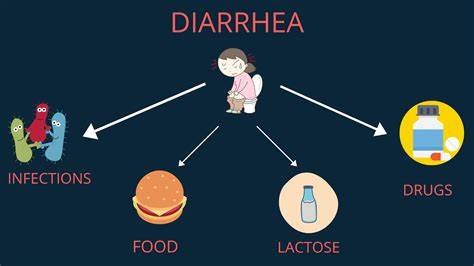Natural Ways to Stop Diarrhea: Symptoms, Remedies, and Dietary Tips
Learn about the causes, symptoms, and effective natural remedies for diarrhoea. This post covers essential dietary tips, including the BRAT diet, to help manage and recover from diarrhoea. Discover how hydration, probiotics, and herbal treatments can soothe symptoms and restore digestive health. Gain insights on what foods to eat and avoid for a quicker recovery.
Nature Cure Lab
4 min read



Understanding Diarrhea: Causes and Symptoms
Diarrhoea is a common gastrointestinal issue characterized by frequent, watery stools. It can be an uncomfortable and inconvenient condition, often accompanied by symptoms such as abdominal pain, bloating, and an urgent need to use the restroom. Understanding the causes and symptoms of diarrhoea is crucial in managing and alleviating this condition efficiently.
Numerous factors can trigger diarrhoea. Infections are one of the primary causes, with viruses, bacteria, and parasites potentially leading to gastrointestinal distress. Common infectious culprits include norovirus, E. coli, and Giardia lamblia. Aside from infections, food intolerances like lactose intolerance or celiac disease can induce diarrhoea when the digestive system reacts unfavourably to certain foods. Stress and anxiety are also notable contributors, as they can disrupt normal digestive processes, leading to diarrhoea.
Recognizing the symptoms of diarrhoea is essential for proper identification and treatment. The primary symptom is the passage of loose, watery stools more frequently than usual. Accompanying symptoms often include abdominal cramping, bloating, nausea, and in severe cases, dehydration. Signs of dehydration—such as dry mouth, increased thirst, lethargy, and dark-coloured urine—should not be ignored and warrant prompt attention.
It's also essential to distinguish between short-term and chronic diarrhoea. Short-term diarrhoea, often lasting a few days, is usually the result of a temporary infection or dietary indiscretion and generally resolves without extensive medical intervention. Conversely, chronic diarrhoea persists for weeks or longer and may indicate underlying health issues such as irritable bowel syndrome (IBS), inflammatory bowel disease (IBD), or other chronic infections.
By grasping the causes and symptoms of diarrhoea, individuals can take proactive steps towards managing their condition. This understanding can aid in identifying potential triggers and adopting appropriate remedies to alleviate symptoms effectively.
Natural Remedies for Diarrhea
When managing diarrhoea, natural remedies can play a crucial role in alleviating symptoms and promoting recovery. Proper hydration is paramount, as diarrhoea can lead to significant fluid loss. Drinking ample water, herbal teas such as ginger or chamomile, and oral rehydration solutions can help prevent dehydration and maintain electrolyte balance.
Probiotics are another valuable tool in addressing diarrhoea. Found in yoghurts and supplements, probiotics introduce beneficial bacteria that help restore the gut's natural flora. This restoration can aid in reducing the duration and severity of diarrhoea. Incorporating probiotic-rich foods or supplements into your diet can assist in stabilizing digestive health during and after an episode of diarrhoea.
Herbal remedies have long been acknowledged for their soothing effects on the digestive system. Ginger, for instance, possesses anti-inflammatory properties that can calm the stomach and intestines. Chamomile tea is another gentle option known for its ability to reduce intestinal spasms, which can alleviate discomfort. Additionally, peppermint has a relaxing effect on the gastrointestinal tract, which can help in reducing symptoms associated with diarrhoea.
Adjusting dietary fibre intake is also beneficial. Foods like bananas, rice, applesauce, and toast (often referred to as the BRAT diet) are particularly effective. Bananas are rich in pectin, a soluble fibre that adds bulk to stool and helps ease diarrhoea. Rice, mainly white rice, is low in fibre and can provide a binding effect, firming up stools and slowing down diarrhoea.
By incorporating these natural remedies—hydration, probiotics, herbal treatments, and careful dietary adjustments—you can manage diarrhoea effectively and support your body's return to normalcy. Remember to consult a healthcare professional before starting any new treatment, especially if symptoms persist or worsen.
Dietary Tips: Best Foods to Eat and Avoid During Diarrhea
Managing diarrhoea effectively requires attention to dietary choices, as certain foods can exacerbate the symptoms while others can aid in recovery. To alleviate symptoms and promote digestive stability, it is crucial to understand which foods to consume and which to avoid.
First and foremost, avoiding high-fat, spicy, and greasy foods is paramount. These can irritate the digestive system and may lead to increased symptoms. The same applies to caffeinated and alcoholic beverages, as they can cause dehydration and further upset the stomach. Foods high in fibre, such as raw vegetables and whole grains, should also be avoided during an episode of diarrhoea as they can be difficult to digest and may worsen the condition.
In contrast, focusing on the BRAT diet—comprising bananas, rice, applesauce, and toast—can be beneficial. These foods are bland and low in fibre, making them gentle on the digestive system. Bananas are particularly effective as they contain pectin, a fibre that helps absorb excess water in the intestines, thereby helping to firm up the stools. White rice and toast provide essential carbohydrates without being harsh on the stomach, while applesauce offers additional pectin and moisture.
Additionally, easily digestible fruits and vegetables should be considered. Examples include peeled apples, carrots, and cooked potatoes, which supply essential vitamins and minerals without burdening the digestive system. Provided they are prepared without added fats, lean proteins such as chicken breast and fish can contribute to nutritional intake without aggravating diarrhoea.
Since they are rich in probiotics, fermented foods like yoghurt and kefir can also play a significant role in restoring gut flora balance. Probiotics introduce beneficial bacteria, which can help reestablish healthy gut function, potentially reducing the duration and severity of diarrhoea.
In summary, dietary choices can profoundly influence the recovery process from diarrhoea. By avoiding irritants like high-fat, spicy foods and incorporating gentle, easy-to-digest options such as those found in the BRAT diet and probiotic-rich foods, individuals can support their digestive health and aid in a quicker return to normalcy.
INSPIRE
Healing from within for a healthier, happier life.
subscribe
info@naturecurelab.com
© 2024. All rights reserved.
